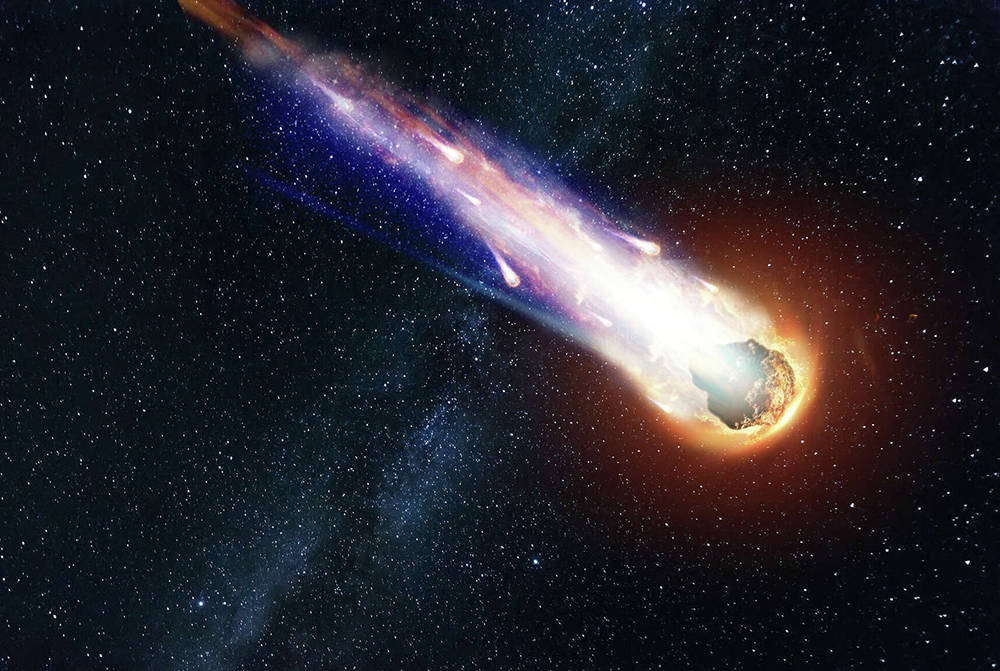

A fireball is a brighter-than-usual meteor. The International Astronomical Union defines a fireball as "a meteor brighter than any of the planets" (magnitude -4 or greater). The International Meteor Organization (an amateur organization that studies meteors) has a more rigid definition. It defines a fireball as a meteor that would have a magnitude of -3 or brighter if seen at zenith.
This definition corrects for the greater distance between an observer and a meteor near the horizon. For example, a meteor of magnitude -1 at 5 degrees above the horizon would be classified as a fireball because if the observer had been directly below the meteor it would have appeared as magnitude -6.
There are probably more than 500,000 fireballs a year, but most will go unnoticed because most will occur over the ocean and half will occur during the daytime.
Fireballs reaching magnitude -14 or brighter are called bolides. The IAU has no official definition of "bolide", and generally considers the term synonymous with "fireball". Astronomers often use "bolide" to identify an exceptionally bright fireball, particularly one that explodes (sometimes called a detonating fireball). It may also be used to mean a fireball which creates audible sounds. In the late twentieth century, bolide has also come to mean any object that hits the Earth and explodes, with no regard to its composition (asteroid or comet). Continue reading
Tuesday July 16, 2024
This morning, as I sat working at my computer, I heard a loud boom just ahead that I assumed was thunder as rain was predicted. I face the Statue of Liberty - the Verrazano Bridge just outside. This is what happened ...
Rare daylight fireball meteor over NYC created loud boom near Statue of Liberty. Live Science - July 17, 2024
A meteor crashed through Earth's atmosphere Tuesday (July 16) morning, creating loud booms that resounded over parts of New York City and New Jersey, NASA reported. Preliminary estimates initially suggested the meteor was traveling northeast and passed over the Statue of Liberty around 11:17 a.m. ET descending at speeds of 38,000 mph. The meteor was small, likely no more than 1 foot (0.3 meters) in diameter, It turned into a fireball due to the heat generated by its high speed. You expect to see meteors at night but not during the day, so this is a rare daylight fireball.
No fragments of the space rock reached the ground - and there were no reports of damage or injuries related to the event.
NBC Updated Report - Eyewitness accounts NBC - July 17, 2024
While looking at the trajectory map I noticed the fireball passed not far from Trump National Golf Club in Bedminster, NJ where he spends a good deal of time. This took me to the April 5, 2024 - New Jersey 4.8 Earthquake - the epicenter in Tewksbury less than 7 miles from Trump's home. Coincidence? Maybe. I sense something not as yet realized.
Eerie green fireball detected hours before smashing into Lake Ontario in the dead of night Live Science - November 22, 2022
A renegade meteor flared in Earth's atmosphere in the wee hours of Nov. 19, creating a bright green fireball in the sky over the eastern US and Canada. This fireball was a small meteor, detected by astronomers just three hours before it tumbled through Earth's atmosphere, caught fire and broke up into hundreds of pieces. Most of those pieces likely smacked straight into Lake Ontario, though some small chunks may have impacted land on the lake's southern shore, according to NASA.
Asteroid 2022 WJ1 impacts Earth over Niagara Falls, becoming the 6th asteroid to be detected before impact Watchers - November 20, 2022
A newly-discovered asteroid designated 2022 WJ1 impacted Earth's atmosphere over Niagara Falls at 08:27 UTC on November 19, 2022, becoming the 6th asteroid to be discovered before impacting Earth.
2022 WJ1 was a tiny asteroid on a collision course with Earth. But astronomers saw it coming, and NASA's Scout impact hazard assessment system calculated where it would hit Live Science - November 23, 2022